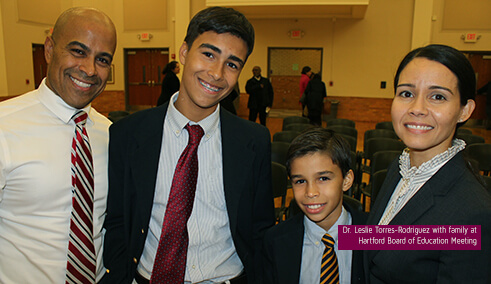Taking a New Look at Equitable Spending on Schools
As the ball descended in Times Square, a lot of shoes have been dropping here: The State is resisting a major, lower-court school finance equity ruling even as the governor announces he will redesign education aid – and Hartford’s mayor is finding tough sledding as he appeals for regional support to forestall City bankruptcy.
There are a number of pieces to the current and coming budget puzzles:
- Brother’s Keeper? With the City facing a $23 million shortfall this fiscal year and a $50 million deficit in fiscal 2018, Mayor Luke Bronin has been meeting in suburban towns to press his case for regional support, but the reception has been chilly.
- Redesign Coming. The $1.5 billion projected State budget deficit for the next fiscal year has prompted Gov. Dannel Malloy to call both for pension reform and a “fairer distribution” of education funds in sync with the local property tax burden, student need, and current enrollment. Here are the full transcript of the governor’s State of the State address yesterday and the CT-N broadcast (the governor’s municipal aid and education focus is at the 15:13 mark of this video).
- Accountability Clause. The governor also pledged to address inequities in school funding, such that no city will have to resort to bankruptcy, although he made plain that fiscal help “shouldn’t come with no strings attached.”
- Work to Do. The governor noted the Hartford Superior Court ruling last year that found the State’s education funding formula unconstitutional. Referencing Judge Thomas Moukawsher’s ruling, the governor asked, “Are we ensuring that all students, regardless of the life circumstances into which they are born, regardless of what city or town they live in, can receive a quality public education? I don’t believe we are meeting that standard.”
- Fine Print. At the same time, the State last month filed its Supreme Court appeal in that case, CCJEF v. Rell, arguing in technical terms that the lower court made mistakes when it found education funding to be irrational. The plaintiffs also plan to appeal. Here is a useful CT Mirror synopsis.
- Local Perspective. Hartford Board of Education Member – and Trinity College Director of Urban Educational Initiatives – Robert Cotto, Jr., offered his personal perspective on the CCJEF v. Rell decision, here.
- Noteworthy. The State also has signaled that it will scale back funds for school construction.
The Bottom Line
The necessity for fairer public education funding in our state, region and city is inarguable.
Factors underscoring the need for drastic change include Hartford’s lack of a tax base, concentration of poverty and need, opportunity to flourish as a regional hub, and unique potential to solve the split-personality segregation that is endemic in every American metro area. We can get our arms around this problem here, if we muster the will.
Mayor Bronin’s appeal for regional cooperation – and the governor’s emphases yesterday – run smack into suburbs’ resentment over the smaller slice of the pie they receive when hard-pressed cities are prioritized. That resentment has to be addressed.
More than at any time in memory, the General Assembly in this session will have to assert leadership at a very high level to address the school improvement deficit in CT cities – the foundation of the shameful state achievement gap that leads the nation.
While state and local leaders work together on fairer funding, a larger redesign of Hartford’s school system is needed in line with fairer funding and student enrollment trends. Now is the time for Sheff negotiations to address squarely the lack of financial viability in the Hartford Public Schools – capped from accepting more suburban students who carry tuition with them, hemorrhaging more students every year from the system, paying tuition for them to attend CREC and suburban schools, and taking on more and more need every year due to poverty concentration. The 2017 year must be the one to figure things out in Hartford – and not just for the next 12 to 18 months.



